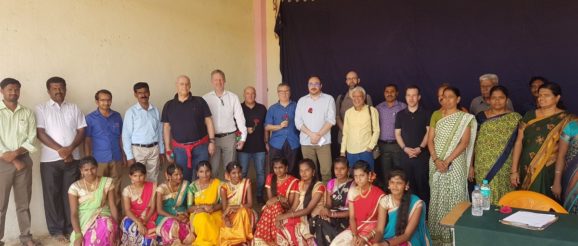Reverse Mission 2020 held in innovation state Karnataka (India) – Districts of Creativity Network – Connecting creative innovation around the world

From March 2-4 the Reverse Mission 2020, the annual work visit to one of the DC Network member regions, took place in Karnataka, India. Declared by the government as the most innovative region of India in 2019, Karnataka is home to a unique innovation ecosystem.
The Karnataka innovation ecosystem
The first day of the Reverse Mission started at the Indian Institute of Science with a general introduction to the region and its capital Bangalore. Bangalore has a long tradition of being an early adopter in innovation. In1905 Asia’s first electric streetlights appeared in Bangalore. Later on in the eighties state-owned enterprises such as Hindustan Aeronautics Limited (HAL) became a catalyst for innovation in aerospace.
In 2005 Karnataka was the first region in India with a start-up policy program and a state funded VC-fund. Nowadays Bangalore is the only city in the world with 100.000 PhD’s. It hosts more than 500 R&D centers and is home to the innovation hubs of major companies such as Airbus, Walmart, Google, Accenture or AB Inbev.
But the region and its capital also face challenges. In a vibrant talk architect Naresh Narasimkan of multi-award winning architecture firm VA Associates advocated the urgent need for more public space, better mobility and creating more sense of ownership of the commons among the citizens of Karnataka. According to the architect, the existing governance structures often overlap and do not communicate well enough.
The afternoon session continued with a series of short presentations of promising start-ups, such as Bellatrix Aerospace, working on solutions to bringing down the cost of access to space and Renalyx, a health start-up creating innovative solutions for renal care.
Two other projects that were showcased were “Chitra Sante”, the biggest art festival of Bangalore and the Thayir Sadam project, a band that creates a blend of Indian classical, electronic and world music. They have conducted workshops with over 5000 school children so far, teaching them global music and promoting social initiatives. One of the initiators, Bindu Subramaniam, finished the day with a warm plea for cross-disciplinary innovation.
In the evening all guests were treated to a spectacular concert of Indian classical music blended with western fusion elements.
From rural creativity to high tech research
The second day took us outside of Bangalore to a local CS Pura village school for an insight in how creativity is applied in a rural context with limited resources.
After holding our annual member meeting, we continued the third day of the Reverse Mission with a tour of several research labs of the Indian Institute of Science. Dr. Hardik J. Pandya of The Biomedical and Electronic Engineering Systems Lab showcased research projects on i.e. new sensors to demarcate benign and cancerous breast tissue and other new types of bio-sensors.
Dr. T.V. Prabhakar demonstrated the Zero Energy Networks Laboratory (Zen lab), where his students and project staff work on building embedded electronic systems for application areas such as airplane cabin, healthcare, smart homes, and other IoT applications.
The final day of the Reverse Mission 2020 ended with a visit to the famous Lalbagh gardens of Bangalore.
From high tech aerospace innovation to cultural interdisciplinary projects and rural creative thinking: this Reverse Mission has shown the extraordinary diversity within the Karnataka innovation ecosystem.
Are you interested in joining the next Reverse Mission 2021 to our member region Catalonia? Contact us for more info!
